

How to Work Smarter, Not Harder: Practical Tips to Get More Done with Less Stress

26 April, 2025
Share this article
Table of Contents
I’m a big fan of working efficiently, or better said, using my time in an efficient manner. Finding ways to better organize my work is always on my list, and technology helps a lot nowadays.
AI has become an important tool in my day-to-day work, something similar to a new type of colleague or assistant. There are so many tools available now that if you’re a knowledge worker, there’s really no excuse not to work smarter.
And this article is here to help, with a few good tips and tricks that actually make a difference. You'll find practical tips to work smarter, improve your time management skills, and start working more efficiently every day.
Focus on What Truly Matters
The main thing I try to teach my younger colleagues is this: not everything on your to-do list deserves your attention.
But somehow, we often end up spending more time on the tasks that don’t really matter. Before you dive into something, ask yourself honestly: is this really moving the business or the project forward?
Learning how to prioritize specific tasks helps you avoid wasting time on busywork and focus only on important tasks.
Some tasks do help you make progress. Others just make you feel busy, like replying “noted” to every email. One of the simplest tips to work smarter is learning the difference. When you focus on important tasks, your day feels more meaningful and less rushed.
It starts with clarity. What actually matters today? What will lead to real results instead of just filling time?
Tools like the Eisenhower Matrix can help you sort tasks by what’s urgent and what’s truly important. Another simple method is the ABCD approach, where you rank tasks by priority.
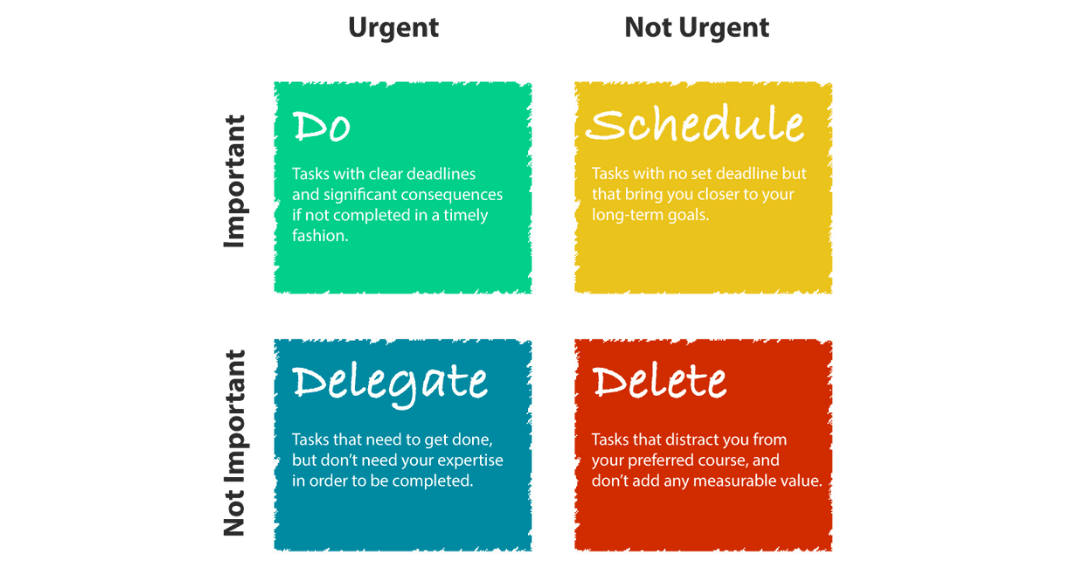
Photo: Slab
Or you can try my approach. Each Monday, choose your top priorities for the week. It helps you stay focused and not drift too far from your plan. There will always be tasks trying to hijack your ship. Better to sail with a map.
Here are a few easy ways to begin:
- Pick your top three priorities and start with those
- Use one of the methods above to clean up your list
- Save your best focus hours for deep or creative work
- Let go of the tasks that don’t really move anything forward
Working smarter is not about doing more. It’s about choosing better.
Master Time Management Skills
Time is the one thing you never get back. Building strong time management skills is crucial if you want to protect your time and energy and avoid feeling overwhelmed.
It’s limited each day and flies fast. If you don’t make use of it, well… it’s not coming back. You’ll end up borrowing from the “time bank” and using those quiet hours when you wanted to go biking.
Think of time like money.
Every hour is an investment.
Ask yourself what’s worth spending it on, and what’s just draining your energy. That small shift in mindset can change how you move through the day.
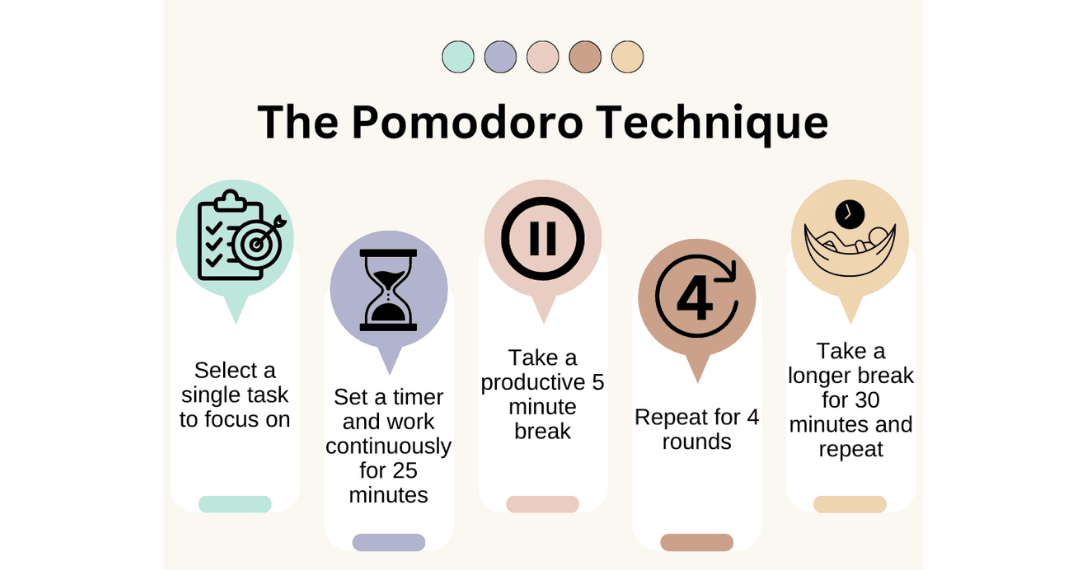
Photo: Pittsburgh University
There are a few techniques that actually help. The Pomodoro technique breaks work into short, focused blocks with breaks in between. It helps you stay sharp.
The 80/20 rule reminds you that most results come from a few key actions. Not from filling every moment with tasks.
And spending five minutes in the morning to plan your day gives you direction instead of guesswork.
You don’t need to build a perfect routine. Just pay attention to where your time goes and make a few small changes.
The more intentional you are with your hours, the easier it gets to stay focused and finish the day with energy left. Working smarter often starts right here.
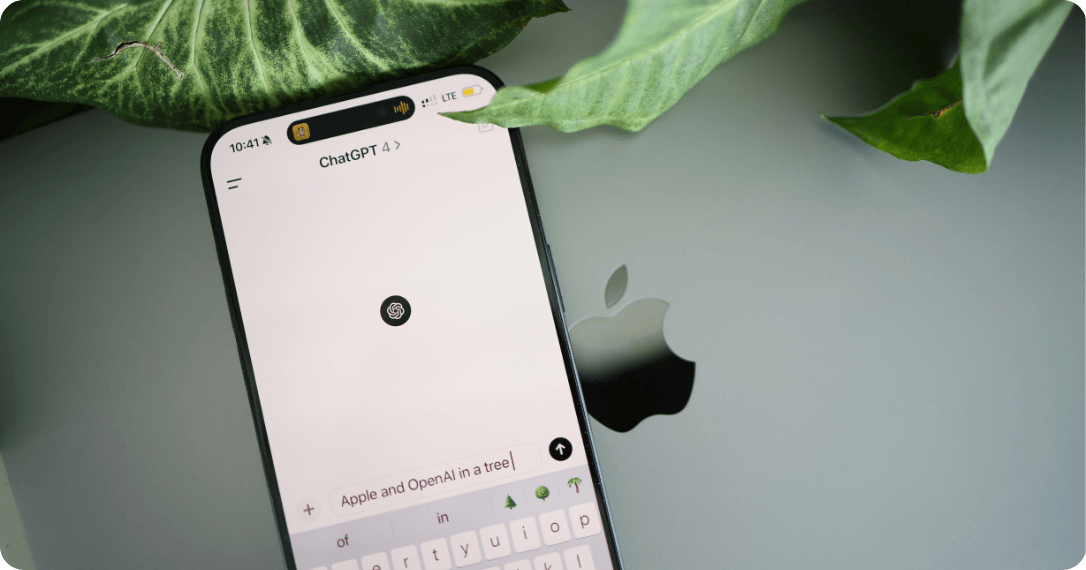
Use AI to Work Smarter, Not Harder
AI can be a useful tool when you use it with intention. It helps you save time, clear your head, and stay focused on the work that actually matters.
You can use it for writing, planning, cleaning up notes, or simply getting started when you feel stuck. It won’t walk your dog or make your coffee, but it might give you back the time to do both.
Start with the areas where you usually feel stuck or slow. AI tools are excellent for working more efficiently, saving time on smaller tasks, and helping you stay focused on important work.
AI is especially useful for things like:
- Writing and editing: Tools like ChatGPT, Grammarly, or Jasper help you write faster, polish your tone, and get past the blank page
- Meeting notes and summaries: Otter.ai, Fireflies.ai, and Sembly transcribe calls and send you clean highlights so you don’t spend the whole meeting typing
- Inbox and calendar management: Superhuman and Motion help you stay on top of messages and plan your day with less effort
- Task automation: Zapier and Make connect your apps so small tasks run in the background without you even noticing
- Research and idea generation: Perplexity.ai and Notion AI help you gather insights, brainstorm, or sketch out a rough outline fast
A few tips to get started:
- Pick one area where you waste time often and try using an AI tool there
- Combine tools when it helps, like using ChatGPT for drafting and Grammarly for edits
- Save your best prompts (they're gold!) or workflows so you don’t start from scratch every time
- Feed the AI a few texts you’re proud of and teach it your tone; later on, it will write more like you, not like a robot trying to sound human
Used well, AI is not about doing less. It’s about freeing up your headspace for real thinking and creative work.
One of the easiest ways to start working smarter is by letting tech take care of the things you never enjoyed doing anyway.
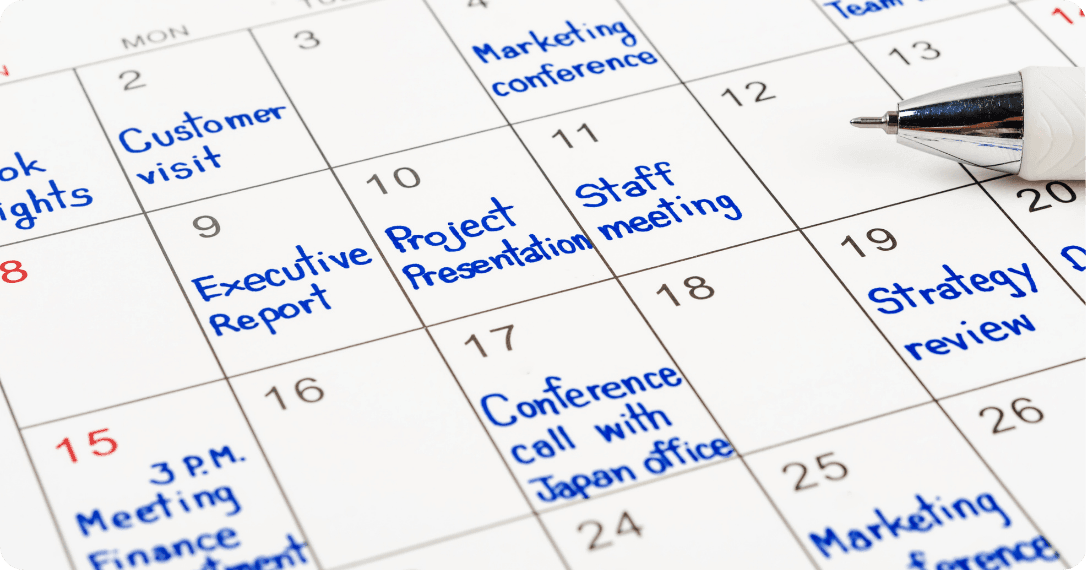
Try Time Blocking for Better Control
If your days feel scattered and you’re jumping from one thing to another, time blocking might be just what you need.
It’s a simple shift, but it makes a big difference. Instead of letting your to-do list decide what happens next, you plan your time in blocks and give each task a clear place in your day.
Time blocking is a powerful time management strategy that lets you allocate the right amount of time for each single task.
Otherwise, your calendar ends up looking like a game of Tetris played by someone with no sleep.
I know people who block recurrent slots just for focused work, so their calendar doesn’t show them as available all the time.
In my case, I work a lot with people on the other side of the world, so I made a habit of blocking my non-working time.
I’m very flexible with my schedule, but I also don’t want to slide into burnout by working at 10 pm.
Start by looking at how your time is actually spent. Do a short audit, even just for one day. Then plan it carefully, considering your energy level and personal time:
- Block time for deep work when your energy is highest
- Batch similar tasks together, like emails or admin
- Leave short breaks between blocks so you don’t feel rushed
It doesn’t have to be perfect. The goal is to add structure, not pressure. After a few days, review what worked and what didn’t.
Adjust as you go. Over time, time blocking becomes less about strict planning and more about creating space for focused, meaningful work.

Focus on One Task at a Time
Multitasking feels productive, but most of the time it just slows you down. Your brain needs time to switch between tasks, and that switching comes with a cost.
Instead of switching between tasks, focus on one task at a time to complete tasks faster and with more clarity.
You lose focus, make more mistakes, and feel more drained. If you want to start working more efficiently, one of the simplest changes you can make is to focus on one task at a time.
Deep focus is where real progress happens. It’s the kind of attention that lets you write, solve problems, or finish something without interruption.
You’re not just ticking off a box. You’re doing meaningful work. And you usually finish faster.
You will need to find the best time in your schedule for this. Protecting your best work hours for focused work helps you stay efficient and energized.
For example, when you work with people in very different time zones, your best hours for focused work might actually be when your colleagues on the other side of the world are offline. It’s quieter, fewer Slack messages, and you finally get the space to focus on something important.
This kind of focus needs the right setup:
- Silence notifications before you start
- Close tabs you don’t need and pause your inbox
- Use a timer to stay focused, then take a short break
You don’t need to spend your whole day in deep work. Even one or two focused sessions can make a big difference. The goal is not to always be busy. It’s to be fully present when it matters.

Use Tech to Automate and Simplify
Technology can save you time or waste it. A smart approach to tech can save huge amounts of time and energy, especially when you automate smaller tasks.
It all depends on how you use it. If you’re looking for practical tips to work smarter, start by letting tech handle the tasks that don’t need your full attention. A bit of automation can make a big difference in how efficiently you work.
There’s a tool for almost everything now.
Zapier connects your apps and handles repetitive tasks in the background.
Notion keeps your notes and projects in one place so you don’t waste time looking for things.
Calendar assistants can book meetings for you without the usual back and forth.
And Pluria helps you find and book workspaces or meeting rooms whenever you need them.
You don’t need a full setup. Just keep it simple:
- Automate the small tasks that slow you down
- Create templates for things you do often
- Keep your digital space tidy so you can focus faster
You don’t have to be a tech expert. Just pay attention to where your time gets stuck and look for one thing you can streamline.
When tech takes care of the details, you get more space to think, create, and move forward. That’s what working smarter really looks like.

Delegate and Streamline Processes
You don’t have to do everything on your own. Delegating specific tasks to trusted team members helps you prioritize important work and free up personal time.
Trying to manage it all is one of the fastest ways to burn out. Working smarter means knowing when to let go and when to let others step in.
Delegating isn’t about offloading tasks. It’s about making space for the work that really needs your attention.
A helpful question to ask yourself is this: what am I doing that someone else could handle just as well? Or maybe even better? Once you know the answer, pass it on with clear instructions and let it go. It doesn’t need to be perfect. It just needs to move forward.
At the same time, take a look at your own routines. Are there tasks you repeat every week or month? Instead of starting from scratch, build a checklist or a simple template. Save it somewhere easy to find and use it again next time. These little systems can save you hours without much effort.
Working smarter isn’t about piling more on your plate. It’s about creating room to think, plan, and do your best work. When you delegate and simplify, you protect your energy and your time. And that’s what helps you show up fully where it matters most.

Create an Environment That Supports Focus
Your environment shapes your focus more than you might think. A cluttered space often makes you feel overwhelmed, while an organized environment helps you stay focused and productive.
A messy desk, nonstop notifications, or not enough natural light can quietly drain your energy. If you want to get into a good rhythm and stay focused, your space needs to help, not distract you.
Start with the basics. Keep your workspace clean and calm. A clear surface, natural light, and a comfortable chair make a real difference. Then look at your digital setup. Close anything you don’t need.
Organize your files. Turn off the pings and pop-ups that break your flow.
It also helps to group similar tasks together. Check email once or twice a day instead of keeping it open.
Put meetings close together so you can protect longer blocks for deep work. Your brain works better when it doesn’t have to keep switching gears.
And take breaks. Real ones. Step away from your screen. Move a little. Breathe. Even five minutes can help you reset. There are apps that remind you to take a break or stretch — and yes, I ignore them too sometimes.
You don’t need a perfect setup. Just one that supports the kind of work you want to do. And once in a while, change the scenery. Go work from a café with a good view or some background noise. Use that time for creative projects or no-call days.

The Real Benefits of Working Smarter
Working smarter isn’t about hacks or squeezing more into the same day. It’s about being clear, intentional, and finding a rhythm that actually works for you.
When you stop reacting to everything and start choosing what really matters, you get more than just productivity. You get your time and your energy back.
When you work smarter, you create a better balance between your career and personal life, leading to sustainable success.
Here’s what working smarter really gives you:
- A way of working that fits you, not the other way around
- Focus on what matters, instead of chasing small tasks
- Better choices and more control over your day
- Space to think clearly and move with intention
- A sustainable pace that does not rely on stress to keep going
- Time back for rest, for people, and for life outside of work
- A real foundation for work-life balance, not just something nice to have
- A habit you can build. And once it works, you will not want to go back
You don’t need a full reset to feel more in control. Just a better rhythm. A better balance. You don’t have to work longer to get results. Work clearer.
Remote work
Keep up to date with our most recent articles, events and all that Pluria has to offer you.
By subscribing to the newsletter you agree with the privacy policy.

In the last two years I’ve been working remotely from over 20 countries but no part of the world compares to Latin America: countries and cultures spreading over two continents with climates[...]
04 December, 2023

A massive move to hybrid work
In 2022, 60% of companies will switch to a hybrid working model, and a third of them will fail on their first attempt to work from anywhere, Forrester p[...]
04 December, 2023
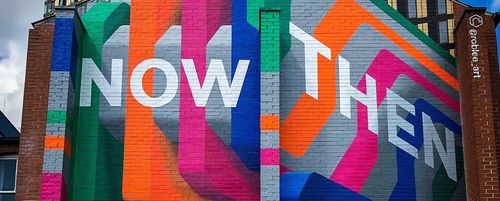
When the employees in the most innovative company on the planet rally against their CEO because he wants them back in the office three days a week, it is a sign that it is not enough to be innovative in tec[...]
04 December, 2023